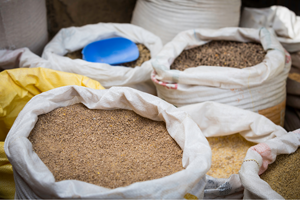Livestock Feed is an Undervalued Opportunity for Food Companies to Achieve Sustainability Goals
Written by: Lara Moody | August 4, 2022
 Most of the environmental impact for animal protein is embedded in the feed that animals eat. By reducing feed impacts, food companies have an opportunity to make significant progress toward climate and sustainability goals.
Most of the environmental impact for animal protein is embedded in the feed that animals eat. By reducing feed impacts, food companies have an opportunity to make significant progress toward climate and sustainability goals.
In support of the upcoming Feed Systems Sustainability Summit, the Institute for Feed Education and Research (IFEEDER) and World Wildlife Fund (WWF) explored this topic in the first of a three-part summer webinar series. This first webinar - Animal Feed - the Secret Ingredient for Meeting Food Company Sustainability Targets - featured Christa Anderson of WWF, Kendra Levine of McDonald’s USA and Brandon Clark of United Dairymen of Arizona (UDA).
Here are four key takeaways from the webinar, along with a video of highlights. To catch all the rich content provided by the discussion, watch the full recording.
Key Takeaways:
1. FLAG can help companies with agriculture and land use in their supply chains set climate targets.
Stakeholders, investors, and consumers are increasingly interested in companies’ plans to address climate change and environmental degradation, but businesses often lack a clearly defined, science-based framework to set goals and targets. The Science Based Target Initiative supports ambitious corporate action on climate in line with climate science.
Agriculture, forestry and other land use sectors account for 22% of global emissions, and land use change is often the most significant source of emissions for food companies. To address this and protect nature and native habitat, food companies need to eliminate deforestation and conversion, especially from growing feed crops, from their supply chains. But until recently, no standard method existed for companies to account for and set targets for emissions in the land sector.
That’s about to change. Launching in the next few months, two tools will be available for companies to use to help them understand their Forest, Land and Agriculture (FLAG) emissions and develop science-based targets along with considerations for strategies to meet those goals.
2. Feed is a significant part of supply chain emissions.
In the global restaurant sector, McDonald’s was an early adopter in setting a science-based target (SBT) and recognized that addressing climate was critical to the resiliency of their agricultural supply chain. Within McDonald’s supply chain, feed is significant.
A collective request Levine identified is that we all have responsibility for the climate, and we need to commit to partnering to create solutions where they may not exist. Unique to feed, she identified the following opportunities for development:
- No feed should be produced on newly converted native habitat like forests and grasslands.
- Employ climate-smart agricultural practices during feedstuffs production.
- Use feed additives to reduce enteric emissions for confined and grazed animals.
- Explore new, more efficient crop varieties that could also reduce enteric emissions.
- Track and share transparent data of actions and outcomes.
3. Set sustainably targets with your employees to ensure buy-in and have a good data baseline.
UDA shared that it has set and received approval for their SBT and the association has included employees in goal development toward increased renewable energy use, reduced water withdrawal and waste diversion from landfills.
Given the impact employees can have on goal achievement, Clark noted the importance of their buy-in for long-term success. UDA also pursued a process that was data driven. Capturing, aggregating and presenting a solid baseline was important to ensure relevance and help stretch UDA’s developed goals. Their carbon goal pushes UDA to reduce Scope 1 and Scope 2 GHG emissions by 50% as well as to achieve general Scope 3 emissions across their supply chain.
The carbon goal linked to Scope 3 has the potential to be drastically impacted by the feed via paths noted above as well as by increased transparency and traceability. UDA is already assessing themselves against their goals so they can identify key focus areas to advance their goals.
4. Feed sustainability is a major opportunity, but we must partner to break barriers and trace to capture results.
Each panelist recognized the potential for more sustainable feed, but also recognized the challenges to implementation of feed related sustainability initiatives, namely accounting for emissions, implementing solutions, and measuring their impact.
To address those challenges, there is a need to “partner like we’ve never partnered before” to address those barriers and break them down quickly. For example, McDonalds is partnering with ranchers and other companies in the Northern Great Plains to support sustainable grazing and grassland management. Collaborating with partners, internal and external, and drawing on expertise from the broad spectrum of stakeholders in the feed value chain is essential to identifying and scaling new and innovative solutions.
This call for thought leadership, partnership and new, innovative ideas mirrors the spirit and purpose of the Feed Systems Sustainability Summit this September, bringing together the full feed value chain to advance a vision for sustainable feed systems.
To take part in the conversation, you can join IFEEDER and WWF for the next installment of the summer webinar series on Aug. 16: LCAs: Should Your Products Have One?